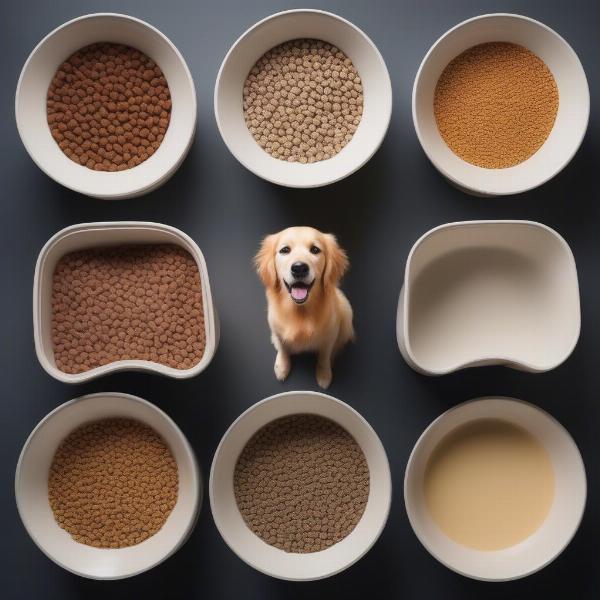Choosing the right food for your Golden Retriever is crucial for their overall health and well-being. A balanced diet helps maintain a healthy weight, supports their active lifestyle, and reduces the risk of breed-specific health issues like hip dysplasia and certain cancers. Finding the “best” dog food depends on your dog’s individual needs, age, activity level, and any potential allergies or sensitivities. Let’s explore the key factors to consider when selecting the perfect food for your golden companion.
Key Nutritional Needs of Golden Retrievers
Golden Retrievers, like all dogs, require a diet rich in protein, healthy fats, carbohydrates, vitamins, and minerals. High-quality protein sources, such as chicken, fish, or lamb, are essential for muscle development and maintenance. Healthy fats, like those found in fish oil, support skin and coat health, as well as cognitive function. Carbohydrates provide energy for their active lifestyle.
Protein Powerhouse
Protein is the building block of your Golden’s muscles, tissues, and organs. Look for foods with a minimum of 22% protein for adult dogs and at least 28% for puppies. dog liquid glucosamine can be a beneficial supplement, especially as your Golden ages, to support joint health.
The Importance of Healthy Fats
Fats play a vital role in a Golden Retriever’s health. They provide energy, support cell function, and contribute to a healthy coat. Omega-3 and Omega-6 fatty acids are particularly important for skin and coat health, reducing inflammation, and supporting cognitive function.
Carbohydrates for Energy
While protein and fats are essential, carbohydrates also provide necessary energy for your active Golden. Look for complex carbohydrates, such as brown rice or sweet potatoes, over simple carbohydrates like corn syrup.
Life Stage Nutrition: Puppy, Adult, and Senior
A Golden Retriever’s nutritional needs change throughout their life. Puppies require higher protein and fat content to support their rapid growth and development. Adult dogs need a balanced diet to maintain their active lifestyle. Senior dogs may benefit from lower calorie and lower fat diets, with increased fiber to aid digestion.
Puppy Power: Fueling Growth
Puppies need a diet specifically formulated for growth. Look for puppy food with higher levels of protein, calcium, and phosphorus to support bone and muscle development.
Maintaining Adult Vitality
Once your Golden reaches adulthood, switch to an adult formula that provides balanced nutrition to support their energy levels and maintain a healthy weight.
Senior Support: Golden Years
As your Golden enters their senior years, their metabolism slows down. Senior dog food formulas often contain fewer calories and lower fat content, with added joint support supplements like glucosamine and chondroitin.
Choosing the Right Food Form: Kibble, Wet, or Raw?
Dog food comes in various forms, including kibble, wet food, and raw diets. Each has its pros and cons. Kibble is convenient and cost-effective, while wet food can be more palatable for picky eaters. Raw diets require careful preparation and can pose potential health risks if not handled properly.
What is the best dog food for a Golden Retriever puppy? Puppy formulas with higher protein and fat are best.
What about the best dry dog food for Golden Retrievers? Look for high-quality kibble with whole meat sources and avoid fillers.
best dog food for golden retrievers is a topic with many options. Consider your dog’s individual needs and preferences.
 A Golden Retriever looking at different types of dog food
A Golden Retriever looking at different types of dog food
Common Dietary Concerns for Golden Retrievers
Golden Retrievers are prone to certain health issues, including hip and elbow dysplasia, allergies, and obesity. Choosing a food that addresses these concerns can help mitigate risks.
“Choosing a diet rich in Omega-3 fatty acids can be particularly beneficial for Golden Retrievers prone to joint issues,” says Dr. Emily Carter, a veterinary nutritionist.
Conclusion
Selecting the best dog food for your Golden Retriever involves considering their individual needs, age, activity level, and potential health concerns. A balanced diet with high-quality ingredients is crucial for maintaining their health, energy, and overall well-being. Consult with your veterinarian for personalized recommendations and remember that proper nutrition is a cornerstone of a long and happy life for your golden companion.
FAQ
- What should I feed my Golden Retriever puppy? A high-quality puppy formula with higher protein and fat content is ideal for supporting growth and development.
- Is grain-free food good for Golden Retrievers? Not necessarily. While some dogs benefit from grain-free diets, others may not. Consult with your veterinarian to determine if a grain-free diet is appropriate for your Golden.
- How much should I feed my Golden Retriever? Follow the feeding guidelines on the dog food packaging and adjust based on your dog’s individual needs and activity level.
- Can I give my Golden Retriever table scraps? It’s best to avoid table scraps as they can contribute to obesity and digestive issues.
- What are the signs of food allergies in Golden Retrievers? Common signs include itchy skin, ear infections, and gastrointestinal upset.
- What is the best dog food for a senior Golden Retriever? Senior formulas with lower calories and added joint support are often recommended.
- Should I supplement my Golden Retriever’s diet? Consult your vet before adding any supplements to ensure they are necessary and appropriate for your dog.
best dog for a single man is a relevant article for those considering bringing a Golden Retriever into their life.
ILM Dog is a leading international pet website specializing in dog care and nutrition. We offer expert advice on breed selection, health care, training, nutrition, grooming, exercise, and much more. From puppyhood to senior care, ILM Dog provides valuable insights and resources for dog owners worldwide. Contact us today for all your dog-related needs! Email: [email protected], Phone: +44 20-3965-8624.